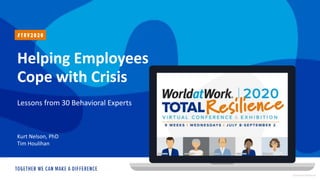
Helping employees cope with crisis - final 6-30-20
- 1. ©2020 WorldatWork Helping Employees Cope with Crisis Lessons from 30 Behavioral Experts Kurt Nelson, PhD Tim Houlihan
- 2. ©2020 WorldatWork Who we interviewed 1 Authors, Researchers, & Academics • Annie Duke – Author of “Thinking in Bets” • Barry Ritholtz – Bloomberg Columnist and Podcaster • Rodd Wagner – Author of “The Power of 2” & “Widgets” • Caroline Webb, PhD – Author of “How to Have a Good Day” • Liz Fosslein – Author of “No Hard Feelings” • Christian Hunt – UK Risk Consultant • Claire Bidwell Smith – Author of “Anxiety: The Missing Stage of Grief” • Samuel Salzer – Author and Consultant – Sweden Behavioral Scientists & Economists • Aline Holzwarth – Director at Center for Advanced Hindsight • Mariel Beasley, PhD – Director of Common Cents Lab • Kristen Berman – Co-Founder of Irrational Labs • Greg Davies, PhD – Economics & Finance in the UK • Alessandro del Ponte, PhD – Economics-Singapore International U • Anurag Vaish – Co-Founder The Final Mile - India Business & Corporate Leaders • James Brewer – Eli Lilly Marketing Director • Michael Boden – VP Sales at Syngenta • Chris Pfeiffer – Director of Analytics at Tegra • Kaveh Yasdifard – Marketing & Innovation in Tehran, Iran Neuroscientist & Psychologists • Brad Shuck, PhD – Psychology at U of Louisville • Wendy Wood, PhD – Psychology at USC • Gretchen Chapman, PhD – Virology and Psychology at Carnegie Mellon • Eugen Dimant, PhD – Sociology at U Penn • Cristina Bicchieri, PhD – Sociology at U Penn • Stephen Curtis, PhD – Neuroscientist • Howard Friedman, PhD – NYU • Jules Nolan, PhD – President Elect MN School Psychologist Association • Ali Fenwick, PhD – Neuroscientist in the UK • Elizabeth Gilbert, PhD - Research lead at Psychology Compass • Margaret Robinson Rutherford, PhD – Psychologist and author • John Bargh, PhD – Psychology professor at Yale • Gary Latham, PhD – I/O Psychology, University of Toronto
- 3. ©2020 WorldatWork Poll #1: I would characterize my company’s handling of the emotional side of the crisis as… Answers: 1. We’ve nailed it 2. We’re doing pretty well 3. We’re coasting and could use some help 4. We need significant improvement in this area 5. Time to abandon ship 2
- 5. ©2020 WorldatWork 4 “We know that we're emotional beings - that a great majority of the decisions we make on a daily basis is based purely on the way we feel about something.” Brad Shuck, PhD University of Louisville
- 7. ©2020 WorldatWork 6 Stress leads to: Narrowing our focus Limits cognitive ability Greater use of heuristics / habits Emotional fatigue
- 9. ©2020 WorldatWork Poll #2: Does your company have an Emotional Playbook to help guide you through the psychology of work in a pandemic? Answers: 1. Yes, we have an Emotional Playbook that we are implementing 2. Not yet, but we are working on something like that 3. No, and not working on anything even similar to that 4. What is an Emotional Playbook? 8
- 10. ©2020 WorldatWork 9 Playbook Components 1. Build a Human Interaction Charter 2. Implement Human Centered Processes 3. Craft Emotionally Proofed Communications 4. Develop Positive Habits and Routines 5. Chart a Clear Path Forward
- 12. ©2020 WorldatWork 11 “A charter is a list of things that we value. These are the things that are important to us.” Jules Nolan, PhD President-Elect Minnesota School Psychologists Association
- 14. ©2020 WorldatWork 13 “We're also going to have to be adaptable moving forward. The same answers that we had a month ago, aren't the same answers that we have today. And today's answers, won't be the same answers that we have a month from now.” Elizabeth Gilbert, PhD Chief Researcher at PsychologyCompass
- 16. ©2020 WorldatWork 15 “We will need more “how are you doing” and less “did you get that done?”“ Michael Boden Vice President of Sales, Syngenta
- 18. ©2020 WorldatWork 17 “When we change our environment, all of a sudden our norms can change, our routines can change, our habits can change.” Kristen Berman Behavioral Scientist, Co-founder of Irrational Labs
- 19. ©2020 WorldatWork Chart a Clear 18
- 20. ©2020 WorldatWork 19 “Number one is that people are, are, are searching for a level of certainty.” Annie Duke Decision Researcher and Author of “Thinking in Bets”
- 22. ©2020 WorldatWork 21 “Our legacy as an organization will be defined in the way that we treat our people today.” Brad Shuck, PhD University of Louisville
- 23. ©2020 WorldatWork 22 “Our legacy as an organization will be defined in the way that we treat our people today.” Brad Shuck, PhD – University of Louisville Tim Houlihan Tim@BehaviorAlchemy.com 612-386-5886 Kurt Nelson, PhD Kurt@LanternGroup.com 612-396-6392
